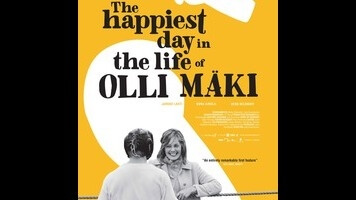Boxing dramas don’t come more charming than The Happiest Day In The Life Of Olli Mäki

Sports biopics tend to emphasize the most dramatic bullet points of their subjects’ lives and careers: the grudge matches, the impossible comebacks, anything that earns its own bolded Wikipedia section. What they don’t tend to focus too heavily on, for perhaps obvious reasons, are the moments between the milestones—not the big wins, but the small stuff, like attending a wedding or trying to jump-start a car or sitting down for an obligatory dinner with a sponsor. The rich, unexpected charm of Finnish award-winner The Happiest Day In The Life Of Olli Mäki is the way it builds a sports biopic out of nothing but mundane foibles. Granted, the movie’s namesake, a now-retired Finnish boxer, hasn’t lived a roller-coaster ride of a life, at least compared to a world-famous champ like Muhammad Ali. But given that the titular pugilist spends most of this minor-key dramatization with his gloves off, it’s clear that upstart director Juho Kuosmanen has deliberately ducked and weaved around the genre’s obsession with glory, to the point where it’d be hard to even identify his movie as a boxing drama. It’s more of a gently comic character sketch in boxing trunks.
There is a climactic match, admittedly. In August of 1962, Olli Mäki took on American champ Davey Moore for the World Featherweight Title—a sporting event that’s still regarded as one of the biggest in Finnish history. The Happiest Day chronicles the two weeks or so leading up to that title fight, as Olli (Jarkko Lahti) travels from his “backwater” hometown to Helsinki to prepare for his big break. But the movie isn’t some long string of inspirational training montages. It instead devotes most of its running time to faintly absurd publicity rituals: Accompanied by his manager, Ellis (Eero Milonoff), a former boxer chasing his own shot at fame and fortune, Olli poses uncomfortably for photo ops, fields questions from reporters that doubt his chances, and “performs” for a film crew Ellis has hired to document his rags-to-riches story. Much of the film’s dry humor derives from the peculiar middle ground that is minor celebrity, which comes with small luxuries but little agency. In Helsinki, Olli sleeps on a narrow twin bunk bed. And as a fighter fighting to make weight, it’s not like he can really partake in the free meals he’s offered at swanky restaurants.
Ellis isn’t the only one grooming Olli for stardom; the whole country seems to have a vested interest in the Baker From Kokkola, putting their hopes and dreams on his hopes and dreams. But is this the life he really craves? Lahti plays Olli sweet and shy and self-effacing, an ordinary lunk shrinking from the attention. “At least I won’t be losing to a bad fighter,” he murmurs into a mic at the big pre-match press conference, all but accepting an impending defeat at the hands of his more experienced opponent. That’s kind of a sports-movie cliché itself—the rising star who’s really just an ordinary dude from the block—but Lahti redeems it through sheer fish-out-of-water understatement; his modesty never looks false. Truthfully, Olli’s priorities lie elsewhere, with Raija (actress-musician Oona Airola, radiating her own everyday charm), the close friend or maybe more with whom he’s become increasingly infatuated. Olli likes Raija not just because she’s strikingly beautiful but also because she doesn’t demand him to be anything but Olli. Their romance unfolds with a sweet, organic hesitancy, hijacking the narrative whenever possible for a rendezvous at the lake or a date at the local fair.
For maximum deglamorization, Kuosmanen shot The Happiest Day In The Life Of Olli Mäki on black-and-white 16mm, which lends it the unvarnished quality, the texture, of the ramshackle American indies and French New Wave classics being made while the real Olli was beginning his rise through the ranks. The director’s style—casually protracted long takes, sometimes abrupt transitions—matches the accomplished but never showboating style of his subject. Inevitably, Olli gets to throw a few punches, in a final bout that makes the famously bittersweet conclusion of Rocky look like the height of cornball wish fulfillment. If the athletic stakes feel unusually low, it’s because both Olli and the film about him see fulfillment outside of the ring and the spotlight, with the love of a particular someone instead of the adoration of everyone. How endearing to encounter a sports movie, if it can even be called that, that prints the man instead of his legend.